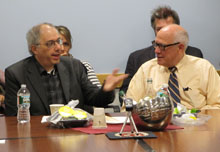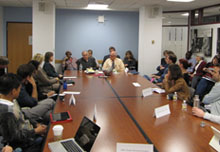Google’s products reflect its character, says Wired‘s Steven Levy

October 23, 2012 – Steve Levy, senior writer at Wired magazine, spent two years immersed in the “Googleplex,” researching how the company works, how it makes money, and what it values. He shared with the Shorenstein Center three key takeaways that he learned from Google, which are featured in his book, In the Plex: How Google Thinks, Works, and Shapes Our Lives.
First, he said, “Google’s products reflect its character,” and its most prominent product, Search, reflects its democratic nature. Search began as a “democracy of choice” that “drew on links from the world wide web to get the most relevant results” – a form of “crowd sourcing.” As Search grew, it “became an AI [artificial intelligence] learning machine,” Levy said, crunching “big data” – the behavior of its users. Google as a result is “possessive about its user logs” so that they can “keep learning and keep ahead of competitors.”
Another product that reflects Google’s character, Levy said, is its ad system, AdWords, which he called “the most successful Internet product, ever.” The search ad system is successful, he explained, because it is directly measurable, and “it benefits not only Google and the advertisers, and but also the users.” As a result, “better ads are sold for less money.”

Finally, Levy said, Google reveals its character in the way that it “tries to negotiate its growth and success – and basically, keep its soul” through its motto, “Don’t be evil.” But as Google grows and faces more complicated questions of morality, the motto becomes “fuzzy.” Censoring their own search results in China “to serve an oppressive political government” was an example of the company deviating from their ethical code, Levy pointed out. When Google finally decided to stop censoring, it was an important moment for the company.
Levy concluded by reflecting on the value of having “all the world’s knowledge in searchable format, in a way that doesn’t steal,” but he also recognized the “unstoppable” revolution of digital technology. While there are “things from the past we hold dear, from the smell of a book to….a job,” he said, “those things are going away,” while “people are flocking to” new technologies.
Article and photos by Janell Sims, Shorenstein Center.